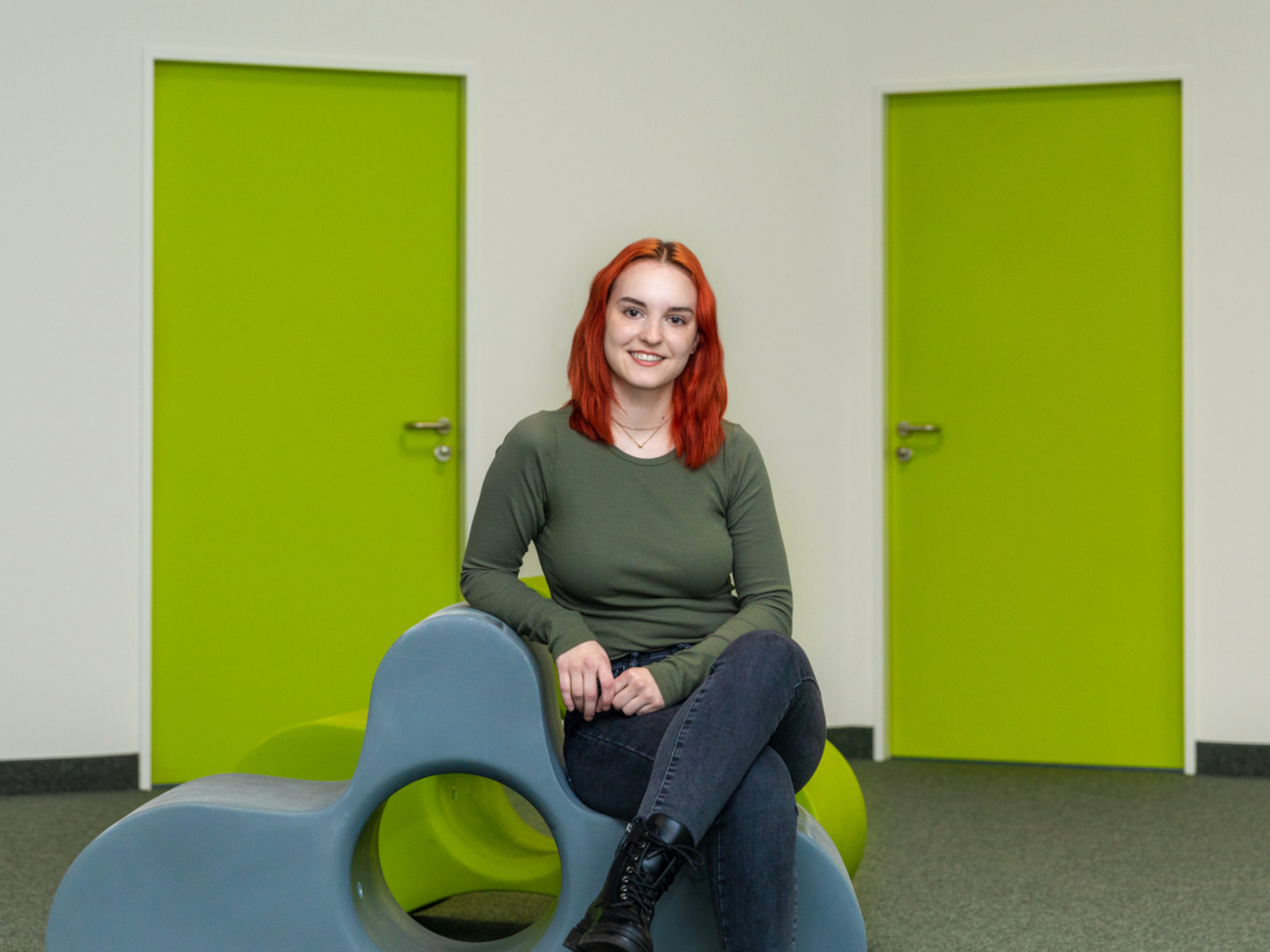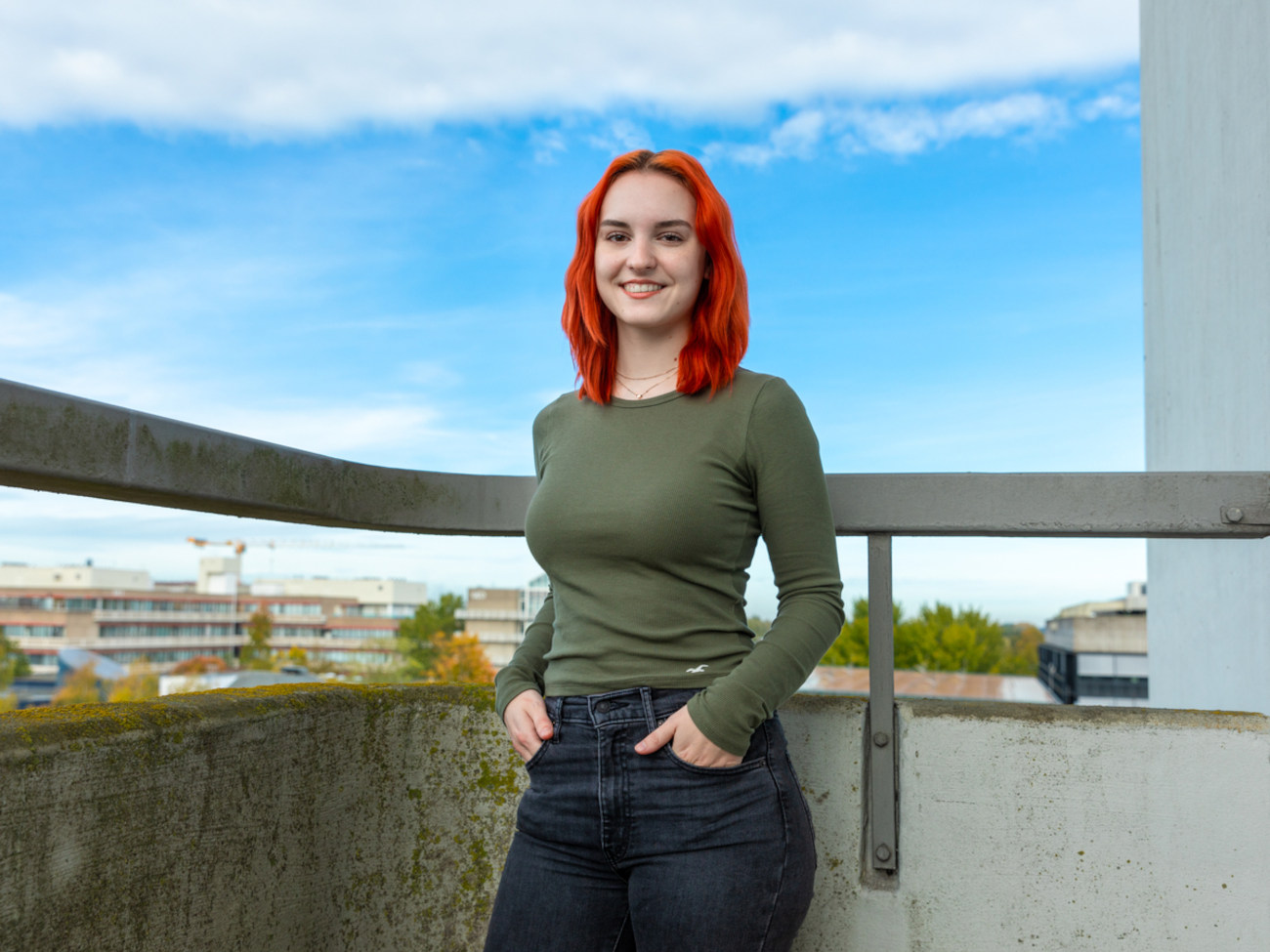
© Matej Meza / Universität Bremen
The Puzzle Solver
The academic mid-level sector in focus: Martha Schnieber from the Computer Architecture Working Group
Young, talented, and already quite successful – not bad prerequisites if you are still at the start of a scientific career. Such as Martha Schnieber from the Computer Architecture working group in the Faculty of Mathematics/Computer Science: her master’s thesis was named one of the best in the German-speaking world in 2021.
Gran Canaria was yesterday. In this context, that means that Martha Schnieber has just returned from the Spanish vacation island. But she didn’t go there to have a break from everday life on the beach, but to present her research approaches to “Digital Systems Design” to colleagues from all over the world at a scientific conference. “I had previously sent in a paper for review, which was the result of my master’s thesis. That was then accepted, and the invitation to the conference was sent out.”
Reward number two, so to speak, for the young woman, because at the age of just 24, Martha Schnieber had already completed her master’s degree in computer science. Her thesis immediately caused quite a stir. It was so good that Springer-Verlag now wants to publish it in the “BestMasters” series. The scientific publisher honors the best master’s theses from universities in Germany, Austria, and Switzerland.
Top Grade from Both Reviewers
The young student from Bremen wrote her final paper in the Computer Architecture working group (AGRA) of the Computer Science degree course. “Before publication in the ‘BestMasters’ series, there is a strict expert review procedure,” says AGRA Director Professor Rolf Drechsler, stressing the high level. Together with Professor Andreas Breiter, he was one of the two reviewers. Drechsler’s verdict: “The fact that the master’s thesis is published at Springer proves Martha Schnieber’s excellent scientific knowledge!” The two reviewers of the university had already awarded a first each.

© Matej Meza / Universität Bremen
Before discussing the content of her work, let’s first describe her path to university – no one is born as a computer scientist at this level, not even Schnieber. She finished her high-school diploma with the advanced courses in mathematics and music at Kippenberg-Gymnasium: “There was no computer science there. I only got to know that at university.” But she has always liked mathematics. She has a big penchant for solving puzzles, “and mathematical problems are sometimes a bit like an intense puzzle. I like stuff like that.”
Martha Schnieber then applied to study computer science at the University of Bremen out of interest: “Let’s see what happens.” Beginners to this degree often complete a preliminary course, “then you take a playful programming course and train logical mathematical and algorithmic thinking. I was good at it,” she recalls. Others were not: according to her, of the 300 bachelor’s students, only around 30 ended up in the master’s degree course.
Advanced to Student Assistant in the Project Semester
She completed the seven-semester bachelor’s degree in Rolf Drechsler’s AGRA group. “I did pretty well and then became a student assistant there,” she says. What do you do as an assistant in a computer science working group? “You help with the research associates’ projects by, for example, programming what they need.” This then evolved to such an extent that she was eventually able to pursue her own interests: “I was allowed to write and publish my own papers during my master’s degree – even before my thesis.”
Studying not as a burden, but as something that you enjoy doing: that’s how Martha Schnieber went about her master’s degree. Theoretical computer science in particular sparked her interest – precisely the area where logical thinking was required “and not just blunt programming,” as she put it, a view that programming fans probably do not share. The theory is more likely to annoy them. “I really enjoyed some of the modules. This also showed me that I had chosen the right thing in computer science.”
“I was allowed to write and publish my own papers during my master’s degree – even before my thesis.”
Let us now turn to the content. Martha Schnieber has a description of the content of her work on the AGRA website: “I’m working on the formal verification of gate-level circuits, especially approximate circuits. Here I prove that the formal verification of certain approximate circuits in polynomial time and polynomial space is feasible by giving polynomial upper limits to the verification complexity.” Please WHAT?
The young computer scientist herself has to laugh a little when laypersons read it out. “The concept of verification is important here. You want to make sure that circuits really do what they’re supposed to do.” Checking circuits can be a complex and time-consuming task – Martha Schnieber’s approach is to keep these checks as lean as possible. The circuits we are talking about here are actually used on hardware chips. She is not alone in dealing with this issue within the working group. She has specialized in “approximate circuits”: “It’s not always necessary to get the right result for computations; it’s enough if it’s usually the case.” A certain degree of inaccuracy is accepted, as long as it’s heading in the right direction – for the applications that are based on it, that’s enough, but it saves time and space.
What Dress Code Applies at an IT Conference?
In July 2022, the native of Bremen had already attended her first scientific conference in Cyprus, after a first paper on the basis of her master’s thesis had been approved. How does it feel to start out into the world of scientists, especially since she had traveled to Cyprus all by herself? “It’s very interesting to find out what other colleagues are working on. You listen to a lot of presentations at a conference, and very few of them are directly related to your own topic. But you learn a lot of exciting things that also inspire you.” Everything was completely new to her, “I first had to find out what kind of dress code was required there.” At least, she didn’t wear the T-shirt with the print “Life sucks” that she was wearing during the conversation in Cyprus. “But computer science is a bit more relaxed. Some of them also wore T-shirts and sandals at the conference.”

© Matej Meza / Universität Bremen
The prospects for the computer scientist are good, as people with her knowledge and skills are desperately sought after. She is convincing in her field of expertise and is initially “fully funded” until the end of 2024 by the ongoing AGRA project, in which she will carry out the aforementioned verification of the circuits. In the medium term, she is aiming at doing a dissertation: “I have different topics that I am currently researching and puzzling over. I’m trying to find solutions, get the results down on paper, and then publish them again.”
What about when things don’t just revolve around science and work? “In my free time, I run – I’ve even done a half marathon before.” Unfortunately, her enthusiasm for music – she plays the harp – has fallen somewhat by the wayside due to her work at university. “And I love reading. But no puzzle books!” smiles Martha Schnieber.